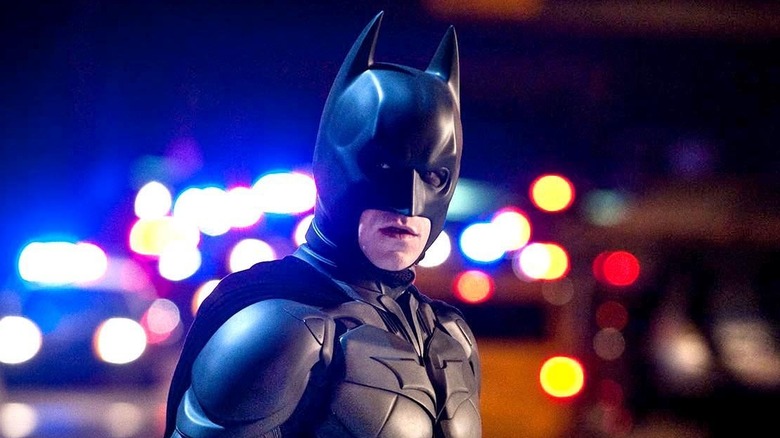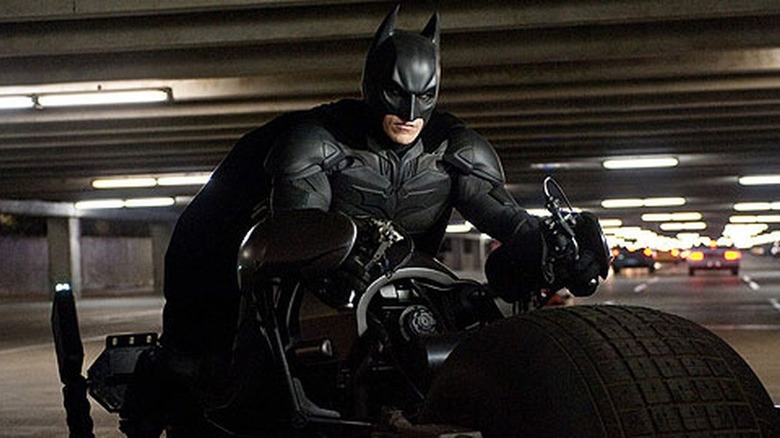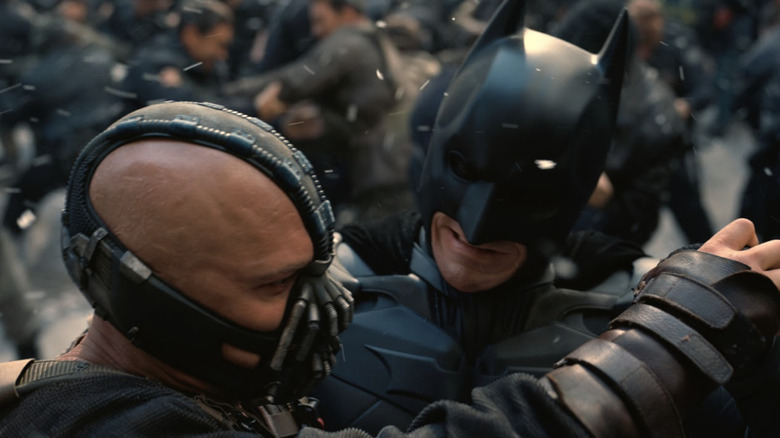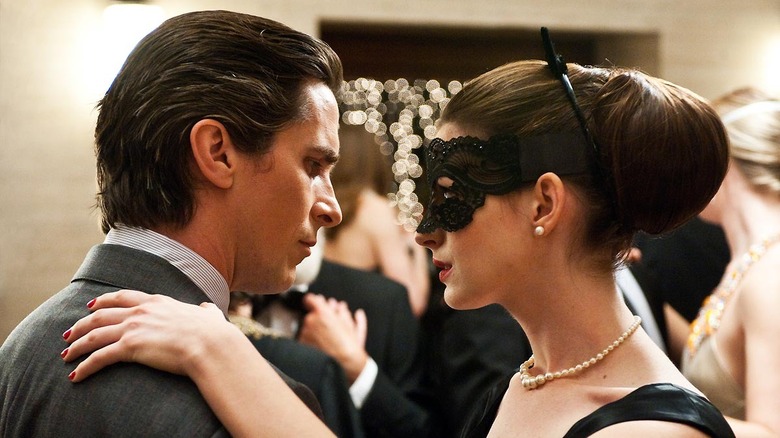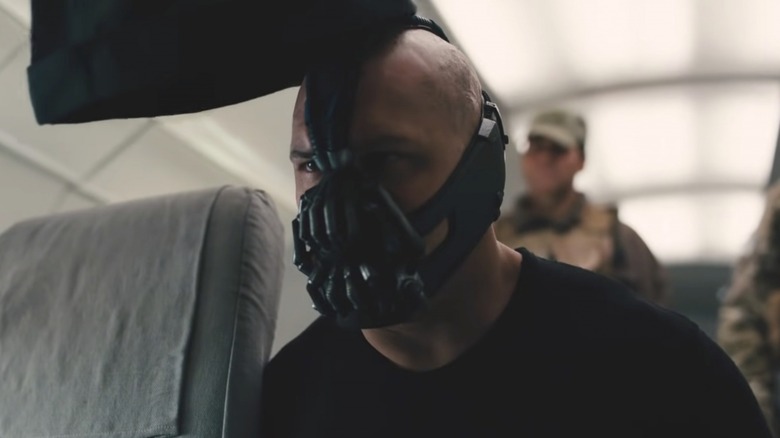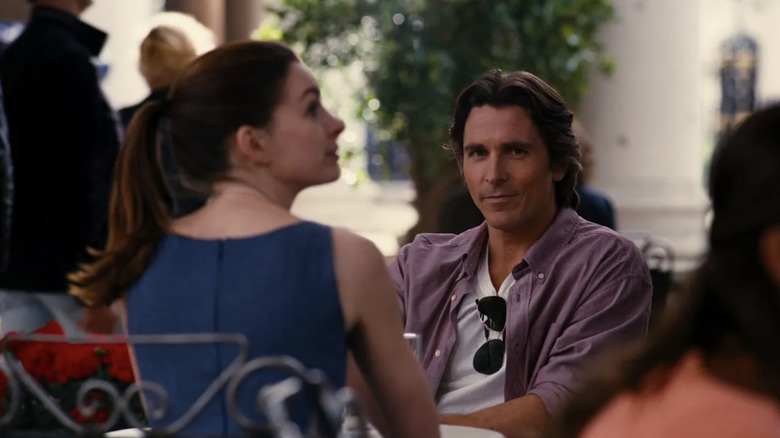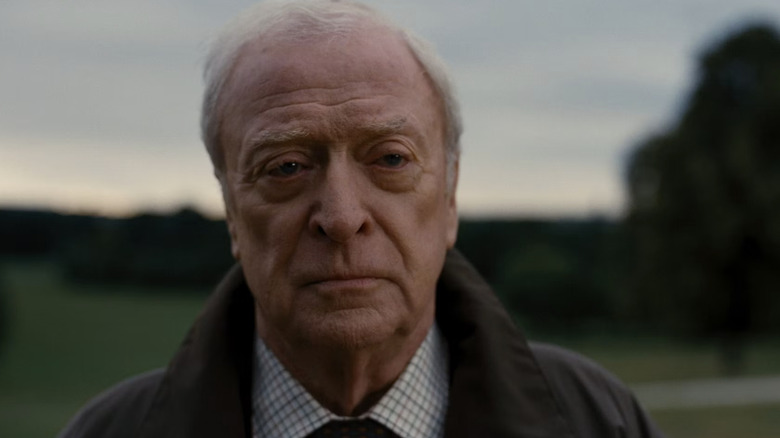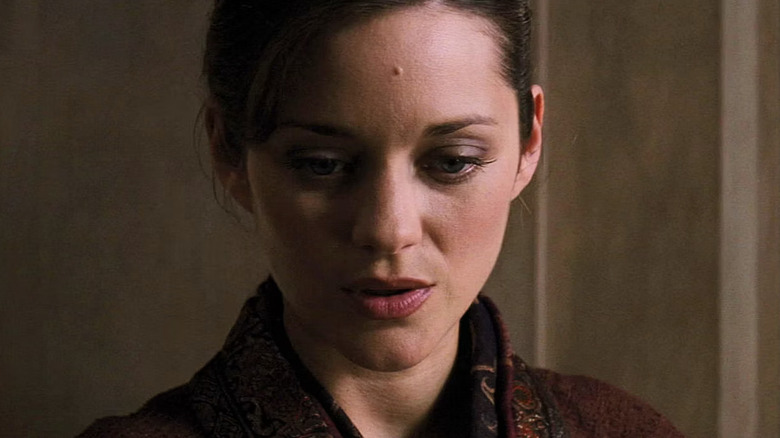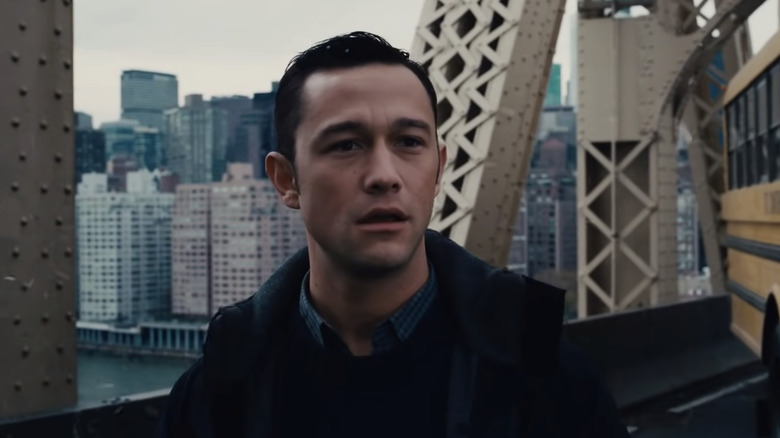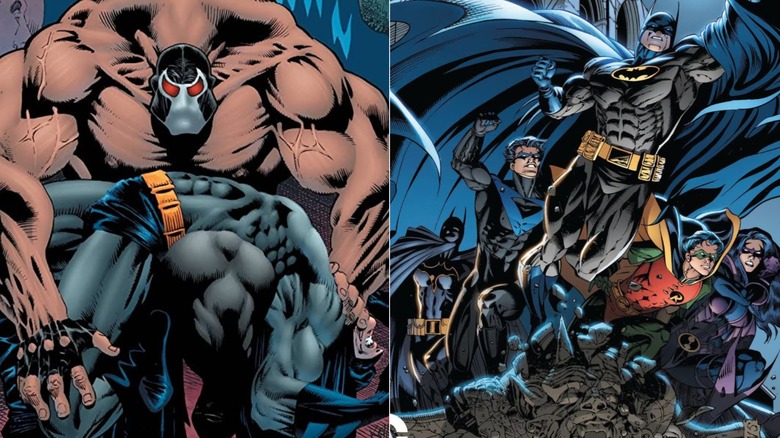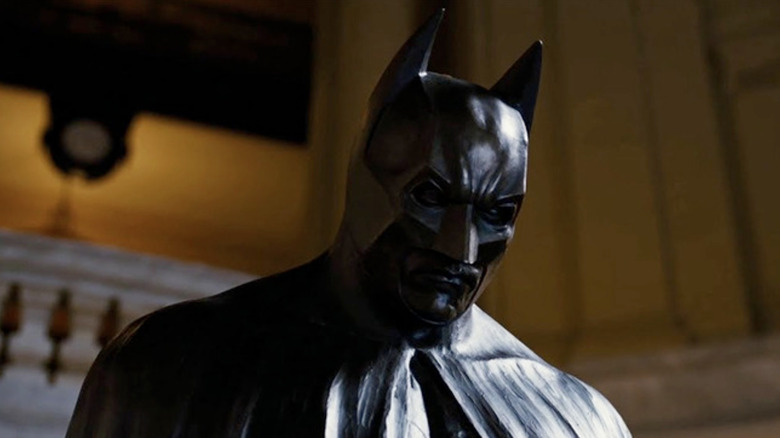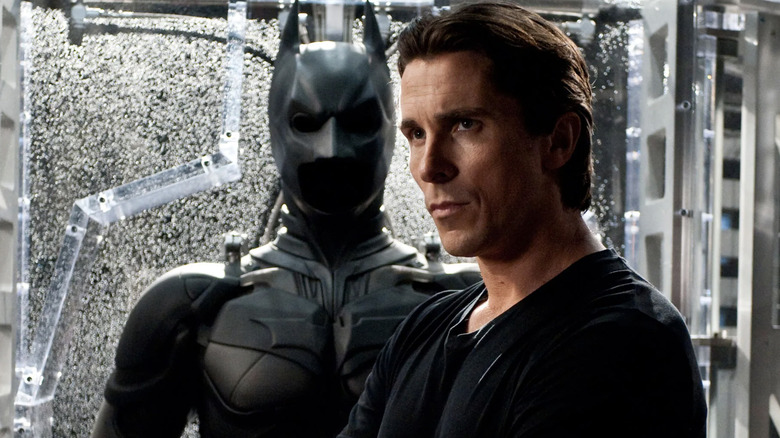The Ending Of The Dark Knight Rises Explained
More than a decade later, the capper to Christopher Nolan's "The Dark Knight" trilogy remains a triumph, completing his Christian Bale-starring Batman saga the only way he knew how. The work of an auteur director at the height of his talent, "Rises" boasts a vision so inarguably impressive that no superhero trilogy has been able to measure up, though many have tried. Not only that, but to this day, Nolan's vision for Batman has often been considered the Caped Crusader's definitive live-action adventure and re-defined what it meant to be a superhero movie.
In the confines of the Nolanverse, Batman's most endearing quality — his resolutely un-godlike humanity — is brought to its logical conclusion: Bruce Wayne can't be Batman forever. Eight years later, the people of Gotham are still under the impression that Batman killed Harvey Dent (Aaron Eckhart). Luckily for the local police, "guys dressed as bats murdering district attorneys" is the kind of fib that shady law enforcement officers go their whole careers waiting for, and Commissioner Gordon (Gary Oldman) has done the best he could to keep the masquerade afloat.
Though "The Dark Knight Rises" came out back in 2012, we're still talking about that knockout ending, and there are still thoughts and questions about it worth revisiting after all this time. So let's revisit the end of Christopher Nolan's Batman trilogy and remember just how the Dark Knight's legacy lives on.
What you should remember about The Dark Knight Rises
Picking up eight years after "The Dark Knight," Christopher Nolan's third installment introduces us to a mostly peaceful Gotham City, a tormented Commissioner Gordon, and a reclusive Bruce Wayne, who stopped being Batman after being framed for Harvey Dent's murder. But after cat burglar Selina Kyle (Anne Hathaway) steals Bruce's mother's pearls and the mercenary Bane (Tom Hardy) arrives and recruits the young men of Gotham to his cause to tear down the city, Bruce dons the cape and cowl once more. Only this time, he fails.
After Bane breaks his back, Bruce is taken to a Middle Eastern prison to watch from afar as the former League of Shadows member dismantles Gotham from within. Separating the city from the mainland, Bane turns Gotham into a no man's land ruled "by the people." Of course, that's all a mirage, as Bane's men are parading a nuclear bomb throughout the city with a mysterious triggerman (a supposed acolyte of Bane's) at the ready.
With Batman away, Detective John Blake (Joseph Gordon-Levitt) — a man who had previously deduced Batman's secret identity — steps up to help defend Gotham in the Dark Knight's absence, but one cop and an underground resistance aren't enough. As Bruce heals, he eventually succeeds in escaping from the prison and returning to Gotham for a rematch with his latest nemesis, even if it means his death.
What happened at the end of The Dark Knight Rises?
By the time Bruce returns to Gotham, the nuclear weapon has deteriorated to the point where it's set to detonate any day. Alongside his allies, Gordon, Blake, and Selina Kyle — who has since repented of her own role in all of this — Batman takes to the streets with an army of Gotham police officers to take back the city from Bane and his men. The Gotham police force overpowers Bane's men, and, beating Bane at his own game, Batman disarms his enemy and demands the trigger. Only Bane doesn't have it.
As it turns out, Bruce's one-time lover and Wayne Enterprises ally Miranda Tate (Marion Cotillard) is the real mastermind behind Bane's plot. Unbeknownst to Batman, Tate's real name is Talia al Ghul, making her the daughter of Bruce's former mentor Ra's al Ghul (Liam Neeson). After Talia betrays Bruce, Selina rescues the Caped Crusader and helps him track down the nuclear weapon. Batman takes it upon himself to fly the warhead out into the Atlantic Ocean and allow it to detonate far away from the people of Gotham.
As the city honors Batman, Lucius Fox (Morgan Freeman), Alfred Pennyworth (Michael Caine), Jim Gordon, and John Blake honor Bruce's sacrifice. But as it turns out, Bruce didn't die after all. After handing the keys to the Batcave over to Blake, Bruce and Selina relocate to Italy, where Alfred watches from afar.
The Cat and the Bat
From the moment Bruce is first robbed by Selina, he becomes immediately infatuated with the elusive cat burglar. In a way, Selina is the one who inspires Bruce to become Batman once again, and she's by his side when he first confronts Bane. Sure, she betrays him in the process, but all sins are forgiven once she sides with Batman post-revolution. No wonder these two end up together in the end, each bringing out the best in the other: Bruce to return to the cowl, and Selina to become a hero in her own right.
Though Bruce spends much of "The Dark Knight" trilogy pining after his childhood friend Rachel Dawes (Katie Holmes, Maggie Gyllenhaal), the revelation that she'd moved on before her death opens the door for a budding romance with Catwoman. More in line with the relationship between the two in the original DC Comics, "The Dark Knight Rises" makes Catwoman a bit more three-dimensional and complicated than previous incarnations, and no longer just another villain.
While it may seem strange that Bruce and Selina end up together, it's worth noting that they both bring much-needed excitement to each other's lives and, while they come from vastly different backgrounds, they quickly learn to better understand the other. No wonder Matt Reeves played on this again in Batman's next solo outing, 2022's "The Batman."
Bane remains Batman's most tactical foe
Christian Bale's Batman certainly has an exciting rogues gallery. Scarecrow (Cillian Murphy) is a constant thorn in Gotham's side, Ra's al Ghul nearly destroyed the Wayne family legacy, and Two-Face sent the Caped Crusader underground. Of course, there's no doubt that the Joker (Heath Ledger) was the most impressive (and most deranged) criminal that the Dark Knight ever encountered, but Bane breaks our hero like no other. Not only does he crush Bruce's body, but also his soul. He would have broken Batman's spirit too had our hero not risen above his pain.
In many ways, Tom Hardy's Bane is a dark mirror of what Bale's Batman could have easily become. Likewise trained by Ra's al Ghul as a member of the League of Shadows, Bane's desire is to see Gotham burned to the ground so that it can be restored, completely motivated by Talia's drive for vengeance. In "Batman Begins," Bruce felt a similar pull and nearly killed the man who killed his own parents. Instead, Bruce chose to be a hero, hoping to inspire others to be the same.
Of course, Bane inspires a group of loyal followers too. He even incites many of Gotham's citizens to turn on one another, exposing the city's darkest secrets and challenging the status quo. If it seems like Batman and Bane work from the same playbook, it's because they do. They each use what Ra's al Ghul taught them, which makes Bane all the more dangerous.
Did Alfred really see Bruce and Selina at the end?
One of the biggest debates among fans is whether or not Alfred's encounter-from-afar with Bruce and Selina at the very end of the film is real or, in reference to director Christopher Nolan's previous hit "Inception," only a vision of what might have been. The case for it being nothing more than a daydream is a compelling one. There's no way that Batman could have survived that nuclear explosion, right? When would he have jumped out of the Bat? Did Alfred just imagine it all?
Of course, there are actual answers to these questions. For starters, the movie explains that Bruce fixed the Bat's autopilot off-screen (allowing him to escape the explosion), that his mother's pearls are missing from Wayne Manor (pearls which Selina had grown accustomed to), and we know that Bruce knows about Alfred's yearly pilgrimage to Florence. No, it seems that Bruce wants his surrogate father to know that he is okay, all without saying a word.
Lending his thoughts, Christian Bale believes that Bruce's happy ending was genuine. "I find it very interesting and with most films, I tend to say 'It's what the audience thinks it is,'" he explains. "My personal opinion? No, it was not a dream. That was for real and he was just delighted that finally he had freed himself from the privilege, but ultimately the burden of being Bruce Wayne." As it turns out, not every Batman has to have a tragic end.
Alfred should never have left Bruce
Speaking of Alfred, it seems odd to many that Bruce's surrogate father would leave just when he needs him most. Sure, Bruce tells him to, but we never imagine he'll actually abandon Batman. Though all is forgiven by the end of "Rises" (Bruce leaves Alfred almost everything), it's still strange that Alfred isn't involved in Batman's last stand. But when you consider how much Alfred has had to tolerate over the years, and how much he cares about Bruce, it may just make sense after all.
The question of what Bruce has to give to be Batman hangs over the entire trilogy, but "Rises" finally addresses how much Alfred is willing to give to help with Bruce's quest. "Alfred asks: 'How long is this gonna go on for? It's not gonna be forever, is it?,'" Christian Bale reflected to Empire in 2020. "That to me has always been fascinating about Bruce Wayne. And it's no secret — in 'The Dark Knight Rises' we come back to the original ideas of what's happening in here, it circles back."
What Bale means is that Alfred has always wanted what was best for Bruce — he just didn't believe that Batman is it. He always supported Bruce's efforts to defend Gotham, but never at the expense of Bruce himself. Turns out that going up against Bane is too much for Alfred to handle, though he regrets leaving by the end.
Wait, who is Talia al Ghul?
The last-minute reveal that Miranda Tate, who has been Bruce's ally for the entire picture, is actually the daughter of his original mentor-turned-nemesis threw many for a loop. Throughout the film, a story is told about a child (Joey King) born in a Middle Eastern prison, the child of Ra's al Ghul, who climbs up and out of the pit. For a long time, the movie leads one to believe that Bane is this child (his comic book history explains that he was born in a prison), but the revelation that Tate is Talia expels that notion.
Longtime DC Comics fans likely saw this twist coming: the most prominent child of Ra's al Ghul in the Batman comics is Talia, who also happens to be Bruce's on-again/off-again lover. In fact, aside from having led the League of Assassins (an alternate name for the League of Shadows), Talia is also the mother of Batman's son Damian Wayne, the current Robin. Of course, in "The Dark Knight Rises," Bruce and Talia only spend one night together, but their passion doesn't result in a pregnancy.
Though Talia isn't mentioned directly in "Batman Begins," the first of Nolan's trilogy alludes to Ra's al Ghul having a family of his own. No wonder that, after Batman defeated her father nearly a decade prior, Talia would eventually return to enact revenge on the Caped Crusader, who she holds responsible for his death.
Does John Blake actually become Robin, or Batman?
At the very end of "The Dark Knight Rises," it's revealed that John Blake's legal first name is actually Robin, a clever surprise and nice nod to Batman's longtime comic book partner. Of course, there have been a plethora of Robins over the years, and in many ways, it seems as if Blake is a sort of amalgamation of a few of them. An agile orphan like Dick Grayson, an angry street kid like Jason Todd, and a skilled detective who deduces Batman's secret identity like Tim Drake, Blake fills the role of Batman's sidekick to a "T."
When the movie ends, Blake joins the longstanding Robin tradition of graduating from the Dark Knight's sidekick to becoming the Dark Knight himself. All three of the aforementioned Robins have become Batman at some point in the comics (even if they took the mantle upon themselves), and others, such as Damian Wayne, may do the same in the future. As "Rises" ends, Blake locates the Batcave and is ushered into Bruce's old life, set to take his mentor's place as the hero Gotham deserves.
While we won't ever get to ever see Blake's version of Batman hit the streets, director Christopher Nolan leaves his "Dark Knight" saga open-ended on purpose to keep the legend of Batman alive. While it's unclear if Blake will become the next Batman himself or forge his own superhero identity, Gotham is no doubt safer in his hands.
The comics that inspired The Dark Knight Rises
Like Christopher Nolan's previous Batman entries, "The Dark Knight Rises" takes elements from a number of iconic DC Comics stories and forges them into an original narrative. "Batman Begins" most notably adapted elements from Frank Miller's "Batman: Year One," while "The Dark Knight" was largely inspired by Jeph Loeb's "Batman: The Long Halloween." But "Rises" instead takes from Batman's later adventures, namely those released in the 1990s.
The first, and most obvious, is the "Knightfall" saga. In "Knightfall," Batman encounters Bane, who has come to Gotham to tear down everything the Dark Knight stands for. He blows up Arkham, releases the inmates, and sets some of Batman's worst enemies on him in order to break his spirit. Then, after weakening Batman — who he knows is secretly Bruce Wayne — Bane breaks his back. Taking time to recover, Bruce passes his mantle onto an ally who becomes all-consumed with the Batman persona. Thankfully, Bruce reclaims his cape and cowl soon after.
The second comic book story to inspire the events of "Rises" is a multi-part series called "No Man's Land." In this arc, an earthquake cripples Gotham as the United States disavows the city, rendering it a "no man's land" until the people of Gotham fight back and rebuild. Much like Scarecrow's kangaroo court in "The Dark Knight Rises," the "No Man's Land" story saw Gotham's most heinous criminals controlling sections of the city. No wonder Nolan borrowed from this one.
The Dark Knight trilogy is about leaving a legacy
"If you make yourself more than just a man, if you devote yourself to an ideal, you become something else entirely ... a legend, Mr. Wayne." In the initial teaser trailer for "The Dark Knight Rises," Ra's al Ghul's infamous line from "Batman Begins" returns paired with clips from the first two installments of Christopher Nolan's trilogy. In "Batman Begins," Bruce constructs the legend of Batman. He trains his body and his mind to become the crime fighter that Gotham needs (even if he's not the hero they deserve), and saves his city.
Batman becomes a living myth who inspires Gothamites everywhere, and by "The Dark Knight," Batman has fully established himself, even inspiring hockey-pad-wearing copycats and theatrical criminals (like the Joker) to come out of the woodwork and make their own mark on Gotham. Without Batman, Harvey Dent may never have defeated the mob, nor gained the public support to do so.
By the time "Rises" ends, Gotham finally recognizes what the Dark Knight has done for them, and honors him in the form of a statue. But that's not all, Blake's decision to take on Bruce's mantle — paired with the repairing of both the Bat-signal and the Bat's autopilot — keeps the legend of Batman alive, even after Bruce Wayne "dies." Ultimately, Batman lives on, and that was always the point.
Could Christian Bale's Batman ever return?
Since Christopher Nolan completed his "Dark Knight" trilogy, many have wondered if Christian Bale's Batman might ever return. It's not like there isn't precedent for former Batmen to make their way back to the screen. In 2023, Michael Keaton reprised his portrayal of Batman in "The Flash" after not playing the part in over 30 years. Alongside him was George Clooney, who appeared again as Bruce Wayne for the first time since 1997's "Batman and Robin."
Of course, a number of new actors have played Batman since Bale's swan song. Ben Affleck played the character throughout the DC Extended Universe franchise from "Batman v Superman: Dawn of Justice" through "The Flash," while Robert Pattinson is playing the character in the Matt Reeves-helmed "The Batman" franchise. With James Gunn and Peter Safran's new live-action DC Universe on the way, there will likely be a new actor succeeding Affleck going forward.
But Bale wouldn't completely rule out returning to the cape and cowl. "I had a pact with Chris Nolan," the actor explained in 2022. "In my mind, it would be something if [Nolan] ever said to himself, 'You know what, I've got another story to tell.' And if he wished to tell that story with me, I'd be in." Since Nolan is busy with films like "Tenet" and "Oppenheimer," it seems like the filmmaker has moved on from superhero epics altogether.
